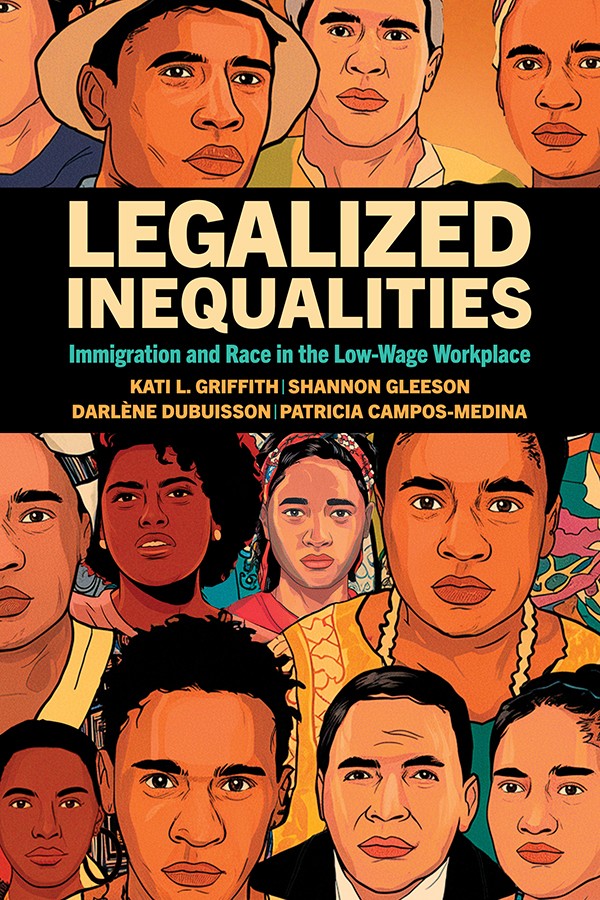Some of the most pressing issues facing low-wage immigrant workers of color in the U.S. include persistent forms of disrespect and abuses of power, according to a new book co-authored by ILR School researchers.
These imbalances, as well as poorly paid and dangerous work environments, are perpetuated in part by U.S. government policies past and present.
In "Legalized Inequalities: Immigration and Race in the Low-Wage Workplace" (Russell Sage Foundation Press), the authors argue that reforming labor and employment law, immigration law and civil rights law is necessary to reshape the low-wage workplace.
The book's authors are Kati L. Griffith, the Jean McKelvey-Alice Grant Professor of Labor-Management Relations in the ILR School; Shannon Gleeson, the Edmund Ezra Day Professor, Labor Relations, Law and History in the ILR School; Darlène Dubuisson, assistant professor of Caribbean studies at the University of California, Berkeley; and Patricia Campos-Medina, executive director of ILR's Worker Institute.
"The positive takeaway is that even though the majority of this book documents all of the challenges low-wage workers face, the really interesting and inspiring thing we saw was that workers aren't just victims," Griffith says. "They are finding creative ways to navigate in this space. They have maintained dignity at work despite the obstacles. Sometimes, they have even found ways to improve their workplaces through what we call gentle nudges or more aggressive actions."
The project began in 2015 when Griffith, a labor and employment law scholar, and Gleeson, a sociologist who does both quantitative and qualitative research, saw the overlap in their interests regarding labor and employment law, the challenges of enforcing workers' rights, and the intersection with immigration policy.
The pair then enlisted the help of Campos-Medina, a political scientist. They were then joined by Dubuisson, an anthropologist and scholar of Haiti, with deep roots in the Haitian communities in New York.
Drawing on interviews with over 300 low-wage Haitian and Central American workers in the U.S. and with more than 50 worker advocates, the book's three parts reveal how U.S. policies produce and sustain poor working conditions and job instability.
In the first part of the book, the authors address labor and employment laws and how they intersect with work experience.
"In the United States, we have what's called 'at-will employment,' meaning you can be fired at any time if you don't have a contract," Griffith said. "We do not have a system that protects jobs. That job precariousness is a real challenge for low-wage workers, and it's often why they tolerate certain things."
The second part of the book focuses on immigration regulations and how they affect an individual's work experience.
The book examines three distinct immigration statuses - undocumented, temporary and permanent. Undocumented workers have no paperwork, are often paid "under the table" and could be deported at any time but still have certain legal rights as individuals who work. Naturalized citizens and permanent residents may be paid low wages but have a status that allows them to live and work in the U.S.
Additionally, "there are a whole bunch of people in the middle, like the 'Dreamers' and those with temporary protected status that are neither citizens nor undocumented," Griffith said. "The government is basically saying, 'We're not going to deport you right now. You can work, but you have no path to citizenship. You have no permanent security here, but we will temporarily allow you to be here and work.'"
Through their conversations with all three sets of workers, the authors were surprised to find that those with temporary protected status sometimes felt the least secure in their workplaces, even compared to their undocumented counterparts.
"We initially assumed that the undocumented workers would be the worst off, but what we found was that they were actually a little less worried about their jobs and their status because they were not on the government's radar," Griffith said. "Whereas, if you have a temporary protected status, the government knows where you live and where you work. You're very findable. So, if, let's say, there's a political shift in the federal government, and the president wants to target immigrants, you're the easiest to find because they've got you right in the system."
The third part of the book culminates with the legacies of legalized racism and the colonial histories that shape migrant experiences.
"We look at how, even though slavery is no longer legal, it still reverberates in today's workplace by framing how workers, especially immigrants of color, experience their treatment at work," Griffith explains. "Haitian workers, for instance, would often say 'like a slave' when they talked about how they were treated at work."
The authors found that one of the most pervasive complaints among the workers was being treated in a way that made them feel disrespected and undignified. Racist attitudes and behaviors were pervasive, not just from an employer but also from the co-workers, patients or customers they interacted with at work.
Further, power imbalances pervade the low-wage workplace, made worse by immigration policies.
In 1986, the U.S. government enacted a law that required employers to check an employee's documents and authenticate that they have authorization to work in this country.
"Basically, that law made all employers mini-immigration enforcers," Griffith says. "Think about the power that gives them over an immigrant worker, even if they never use it. It makes an already imbalanced power relationship even worse."
The book concludes with several policy suggestions, such as increasing funding for workers' rights enforcement agencies, removing the mandate for employers to verify a worker's immigration status and making it easier to prove that employment discrimination has occurred. It also calls for a new paradigm for labor scholarship, one that incorporates the intersection of immigration and racial inequality at work.
Julie Greco is the communications director for the School of Industrial and Labor Relations.







